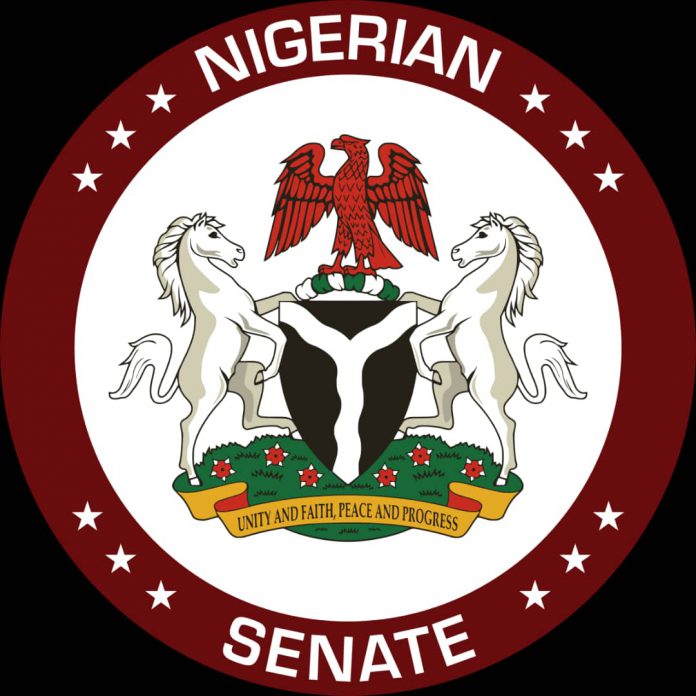The Senate has passed the 2022-2024 Medium Term Expenditure Framework and Fiscal Strategy Paper (MTEF/FSP) ahead of the expected presentation of the 2022 Appropriations bill to the National Assembly by President Muhammadu Buhari.
The passage of the 2022-2024 Medium Term Expenditure Framework followed the consideration and exhaustive deliberation of a report by the Joint Committees on Finance; Local and Foreign Debts; Banking, Insurance and other Financial Institutions; Petroleum Resources (Upstream); Downstream Petroleum Sector and Gas.
The Joint Committee report was presented by Senator Solomon Olamilekan Adeola (APC, Lagos West), who chairs the Finance Committee.
The chamber during consideration of the report gave its nod to the Federal Government’s revenue projection of N8.36 trillion; and proposed expenditure of N13.98 trillion.
Accordingly, it also approved the daily crude oil production of 1.88mbpd, 2.23mbpd, and 2.22mbpd for 2022, 2023 and 2024, particularly “in view of average 1.93mbpd over the last 3 years and the fact that a very conservative oil output benchmark has been adopted for the medium term in order to ensure greater budget realism”.
The Senate in its recommendations approved the Benchmark oil price of $57 per barrel; adopted the Exchange Rate of N410.15/US$ by the Executive for 2022-2024, and gave its nod to the projected Gross Domestic Product (GDP) growth rate of 4.20%; as well as 13% inflation rate.
In addition, the chamber approved a fiscal deficit of N5.62 trillion; new borrowings of N4.89 trillion – an amount which includes Foreign and Domestic borrowing – subject to the provision of details of the borrowing plan to the National Assembly.
The Senate also approved other parameters such as Statutory transfers totalling N613.4 billion; Debt Service estimate of N3.12 trillion; Sinking Fund to the tune of N292 billion; Pension, Gratuities and Retirees Benefits of N567 billion.
Out of the Aggregate Federal Government’s Expenditure of N13.98 trillion, the upper chamber approved the sum of N6.12 trillion for Total Recurrent (Non-debt); N3.47 trillion as Personnel Cost for Ministries, Departments and Agencies (MDAs); N3.26 trillion for Capital Expenditure (exclusive transfers); N350 billion Special Intervention (Recurrent); and N10 billion for Special Intervention (Capital).
The upper chamber in its report recommended that the Fiscal deficit estimate of N5.62 trillion also be sustained due to the Federal Government’s conservative approach to target setting and its determination to improve the collection efficiency of the major revenue-generating agencies.
It further called on the Salaries and Wages Commission to review the salary structure of all Ministries, Departments and Agencies (MDAs), in other to come up with a new salary structure that will reflect the true financial position of the Agencies.
The chamber also demanded a continuous review of the Fiscal Responsibility Act to ensure that all revenues are remitted to the Consolidated Revenue Fund (CRF) as at when due, in order to curtail frivolous deductions and diversion of funds by the MDAs.
It further maintained that all laws relating to mining businesses be reviewed as a matter of urgency, to ensure upward review of rates applied to royalties, ground rent and licenses renewal of all mining companies operating in Nigeria to ensure transparency in the collection of revenue by relevant agencies, as well as recommend stringent sanctions in proposed new laws to address illegal mining.
The Senate amid its recommendations also called on the Nigeria Customs Service to accelerate the process of installing scanners at all ports across the country to curb the issues of smuggling and underpayment of customs duties on imported goods which has resulted in a huge loss of revenue to the government.
It also charged the Federal Government to urgently implement the Petroleum Industry Act recently assented to by the President in order to curtail the problems of smuggling and round-tripping of petroleum products imported into the country.
In addition, the chamber recommended that the proposed budget of Government Owned Enterprises (GOEs) be reviewed upward to show the reflection of their capabilities to generate more revenue as a result of the findings of the Joint Committee.
Consequently, it further recommended that the offices of the Accountant General (AGF), Auditor General of the Federation (AuGF) and Fiscal Responsibility Commission be strengthened in the area of staffing and proper funding of its activities to ensure optimal performance of their duties in order to adequately monitor the remittances of all government revenue.
The chamber posited that the Act establishing some MDAs such as – Nigeria Investment Promotion Council (NIPC), National Lottery Trust Fund Act, Bank of Industry Act, Bank of Agriculture Act, Energy Commission Act and Nigeria Nuclear Regulatory Commission – if reviewed and amended as a matter of urgency, would assist to generate more revenue to the coffers of government.
It also recommended that the Federal Government budget be reviewed and purged of some agencies with demonstrated capacity to stand on their own without any recourse to the Federal Government of Nigeria budget.
The chamber gave examples of such agencies to include the National Agency for Food and Drug Administration and Control (NAFDAC) and the Nigerian College of Aviation Technology, Zaria.











